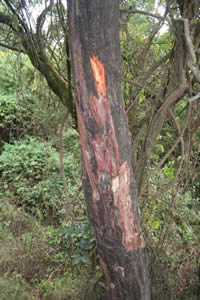|
|
|
|
| Common Names : |
| Actions: penile hardness, prostate support |
| Medicinal Uses:hair loss prevention |
| Parts Used: bark |
| Constituents:beta-sitosterol, pentacyclic triterpenes (ursolic and oleanic acids), ferulic acid nesters (n-docosanol and tetracosanol) |
|

Pygeum is an evergreen tree native to the higher elevations of central and southern Africa. The bark has been used by the indigenous peoples of the region since ancient times. Because of the popular demands of modern man for the sexual enhancing prowness of pygeum products, the tree has become has become an endangered species in parts of Africa.
When taken correctly, pygeum is considered one of the safest herbs used for male health, and often is combined with saw palmetto for maximum results. Research indicates that the lipophilec (fat soluble) active constituents, phytosterols, have anti-inflammatory effects which are achieved by interfering with the formation of prostaglandins, hormones that tend to accumulate in the prostates of men with BPH. (1)
When it comes to helping make erections firmer pygeum has demonstrated its ability as a player. If you are an older male at risk for prostate enlargement, benign or otherwise, this herb is helpful. (2)
|
|
Preparation Methods :One hundred to 200 milligrams of a standardized supplement daily. Almost all the research on the medicinal properties of pygeum has been done on extracts that were concentrated to particular levels of the active ingredients: 14% terpenes, N-docosanol, and beta sitaosterol. Tinctures. Pygeum can be used with saw palmetto, stinging nettle root, and/or bee pollen to treat BPH.
|
|
 Buy Bulk Organic Pygeum Buy Bulk Organic Pygeum
|
| Side Effects: |
|---|
| Safe when taken at recommended dosages. In rare instances, there may be stomach upset, headache, nausea, or visual disturbances. |
| |
- James Duke, The Green Pharmacy Herbal Handbook (2000)
- Chris D. Meletis, Better Sex Naturally (2000)
|
|
|
|
|
|